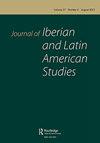Learte’s dream. Spanish transatlantic mobility in the eighteenth century through the autobiography of a Navarrese migrant
IF 0.3
0 HUMANITIES, MULTIDISCIPLINARY
Journal of Iberian and Latin American Studies
Pub Date : 2022-09-02
DOI:10.1080/14701847.2022.2140957
引用次数: 0
Abstract
ABSTRACT Fracasos de la fortuna is the title of Miguel de Learte Zegama’s autobiography written during the 1780s. Learte Zegama, born in Sangüesa (Navarre) circa 1731, decided to write his memoirs from his childhood in the north of Spain, his years in Cadiz, his travel into the Canary Islands, and his emigration to the province of Rio de la Plata around 1750. This narrative outlines a personal defence of the author to rebuild his deteriorated reputation after the expulsion of the Jesuits from the Gobernación of Tucumán based on his mobility. The present article focuses on two aspects of (t)his story that illuminate the transitory dimension of the migrant’s experience and its subjective fluidity: the impulses and self-presentation. Firstly, I address the two main impulses of Learte to migrate from Cadiz to America and, later, from Tucuman to Navarre. Then, I examine the account of Learte’s sojourn in the Canary Islands and the ambivalent peninsular and American perspective from which he writes. Thus, this case study provides an example of eighteenth-century mobilities, problematising categories like “merchant” or “creole,” and demanding an approach that recognizes formative paths, contingency and multidirectional character of mobility, as constitutive of the early modern experience.Learte的梦想。通过一个纳瓦拉移民的自传来了解十八世纪西班牙人跨大西洋的流动
摘要:《幸运之城》是米格尔·德·利特·泽加马在18世纪80年代创作的自传。利尔特·泽加马(Learte Zegama)大约于1731年出生在桑萨(纳瓦拉),他决定写回忆录,从他在西班牙北部的童年,他在加的斯的岁月,他到加那利群岛的旅行,以及他在1750年左右移民到拉普拉塔河的省。这段叙述概述了发件人的个人辩护,以便在耶稣会士因其流动性而被驱逐出Tucumán的Gobernación后重建其恶化的声誉。本文聚焦于他的故事的两个方面,这两个方面阐明了移民经历的短暂维度及其主观流动性:冲动和自我呈现。首先,我阐述了莱特从加的斯移民到美国以及后来从图库曼移民到纳瓦拉的两个主要动机。然后,我考察了利尔特在加那利群岛的逗留,以及他写作时从半岛和美国的矛盾视角出发。因此,本案例研究提供了一个18世纪流动性的例子,提出了“商人”或“克里奥尔人”等类别的问题,并要求一种认识到流动性的形成路径、偶然性和多向性特征的方法,作为早期现代经验的组成部分。
本文章由计算机程序翻译,如有差异,请以英文原文为准。
求助全文
约1分钟内获得全文
求助全文
来源期刊

Journal of Iberian and Latin American Studies
HUMANITIES, MULTIDISCIPLINARY-
CiteScore
0.40
自引率
33.30%
发文量
23
 求助内容:
求助内容: 应助结果提醒方式:
应助结果提醒方式:


